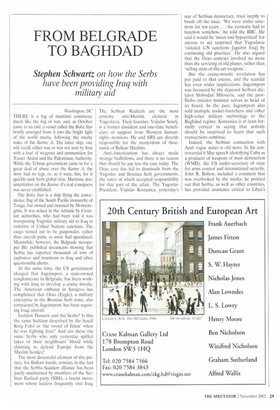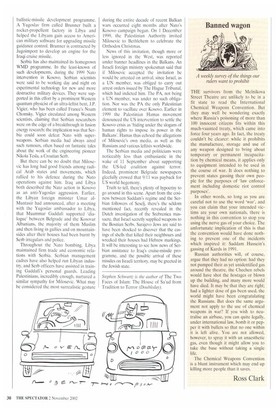FROM BELGRADE TO BAGHDAD
Stephen Schwartz on how the Serbs have been providing Iraq with military aid
Washington, DC THERE is a fog of maritime commerce much like the fog of war, and, as October came to an end, a vessel called the Boka Star briefly emerged from it into the bright light of the world media, following the murky wake of the Kathie A. The latter ship, one will recall, either was or was not sent by Iran with a load of weapons and ammunition for Yasser Arafat and the Palestinian Authority. While the Tehran government came in for a great deal of abuse over the Karine A, the story had no legs, or, as it were, fins, for it quickly sank from global view. Maritime documentation on the Katine A's real consigners was never established.
The Boka Star is a ship flying the convenience flag of the South Pacific monarchy of Tonga, but owned and manned by Montenegrins. It was seized in the Adriatic by Croatian authorities, who had been told it was transporting Yugoslav military aid to Iraq in violation of United Nations sanctions. The cargo turned out to be gunpowder, rather than aircraft parts, as some had speculated. Meanwhile, however, the Belgrade newspaper Mk published documents showing that Serbia has exported thousands of tons of explosives and munitions to Iraq and other questionable clients.
At the same time, the US government charged that Jugoimport, a state-owned conglomerate in Belgrade, has been working with Iraq to develop a cruise missile. The American embassy in Sarajevo has complained that Orao (Eagle), a military enterprise in the Bosnian Serb zone, also contracted by Jugoimport, has been repairing Iraqi aircraft.
Saddam Hussein and the Serbs? Is this the same Saddam described by the Saudi King Fahd as 'the sword of Islam' when he was fighting Iran? And are these the same Serbs who only yesterday spilled lakes of their neighbours' blood while claiming to defend Europe from the Muslim hordes? The Serbian Radicals are the most extreme anti-Muslim element in Yugoslavia. Their founder, Vojislav Seselj, is a former dissident and one-time beneficiary of support from Western humanrights monitors. He and SRS are directly responsible for the martyrdom of thousands of Balkan Muslims.
Anti-Americanism has always made strange bedfellows, and there is no reason that should be any less the case today. The Orao case has led to dismissals from the Yugoslav and Bosnian Serb governments, the latter of which accepted responsibility for that part of the affair. The Yugoslav President, Vojislav Kostunica, yesterday's star of Serbian democracy, tried ineptly to brush off the issue. 'We were under sanctions for ten years . the economy had to function somehow,' he told the BBC, He said it would be 'mean and hypocritical' for anyone to act surprised that Yugoslavia 'violated UN sanctions [against Iraq] by continuing old practices'. He also argued that the Orao contract involved no more than the servicing of old planes, rather than 'selling state-of-the-art weapons'.
But the cruise-missile revelation has put paid to that excuse, and the scandal has even wider implications. Jugoimport was favoured by the deposed Serbian dictator Slobodan Milosevic, and the postSlobo interior minister serves as head of its board, In the past. Jugoimport also sold multiple rocket-launchers and other high-value military technology to the Baghdad regime. Kostunica is at least forma]ly correct in saying that nobody should be surprised to learn that such transactions continue.
Indeed, the Serbian connection with Arab rogue states is old news. In his controversial 6 May speech identifying Cuba as a producer of weapons of mass destruction (WMD). the US under-secretary of state for arms control and international security, John R. Bolton, included a comment that was overlooked by the media: he pointed out that Serbia, as well as other countries, has provided assistance critical to Libya's ballistic-missile development programme. A Yugoslav firm called Brunner built a rocket-propellent factory in Libya and helped the Libyans gain access to American military software for upgrading missile guidance control. Brunner is contracted by Jugoimport to develop an engine for the Iraqi cruise missile.
Serbia has also maintained its homegrown WMD programme. In the least-known of such developments, during the 1999 Nato intervention in Kosovo. Serbian scientists were said to be working day and night on experimental technology for new and more destructive military devices. They were supported in this effort by a prominent Western quantum physicist of an ultra-leftist bent. J.P. Vigier, who has been called France's Noam Chomsky. Vigier circulated among Western scientists, claiming that Serbian researchers were on the edge of a breakthrough in fusion energy research; the implication was that Serbia could soon defeat Nato with superweapons. Serbian media had always aired such rumours, often based on fantastic tales about the work of the engineering pioneer Nikola Testa, a Croatian Serb, But there can be no doubt that Milosevic has long had good friends among radical Arab states and movements, which rallied to his defence during the Nato operations against him. Iraq and Libya both described the Nato action in Kosovo as an anti-Yugoslav aggression. Earlier. the Libyan foreign minister Urnar alMuntasir had announced, after a meeting with the Yugoslav ambassador to Libya, that Muammar Gaddafi supported 'dialogue' between Belgrade and the Kosovar Albanians, the majority of them Muslim and then living in gullies and on mountainsides after their houses had been burnt by Serb irregulars and police.
Throughout the Nato bombing, Libya maintained firm trade and economic relations with Serbia. Serbian management cadres have also helped run Libyan industry, and Serb officers have assisted in training Gaddaffs personal guards. Leading Palestinians, incredibly enough, nurtured a similar sympathy for Milosevic. What may be considered the most surrealistic gesture during the entire decade of recent Balkan wars occurred eight months after Nato's Kosovo campaign began. On 1 December 1999, the Palestinian Authority invited Milosevic to Bethlehem to celebrate the Orthodox Christmas.
News of this invitation, though more or less ignored in the West, was reported under banner headlines in the Balkans. An Israeli foreign ministry spokesman said that if Milosevic accepted the invitation he would be arrested on arrival, since Israel, as a UN member, was obliged to carry out arrest orders issued by The Hague Tribunal, which had indicted him. The PA, not being a UN member, was under no such obligation. Nor was the PA the only Palestinian element to vacillate over Kosovo. Earlier in 1999 the Palestinian Hamas movement denounced the US intervention to settle the Kosovo crisis as 'hiding under the slogans of human rights to impose its power in the Balkans'. Hamas thus echoed the allegations of Milosevic's own media, as well as the Russians and various leftists worldwide.
The Serbian media and politicians were noticeably less than enthusiastic in the wake of 11 September about supporting the US-led coalition against terror. Indeed, prominent Belgrade newspapers gleefully crowed that 9/11 was payback for US world hegemony.
Truth to tell, there's plenty of hypocrisy to go around in this scene. Apart from the cosiness between Saddam's regime and the Serbian followers of Seselj, there's the seldom mentioned fact, recently revealed in the Dutch investigation of the Srebrenica massacre, that Israel secretly supplied weapons to the Bosnian Serbs. Sarajevo Jews are said to have been shocked to discover that the casings of shells that killed their neighbours and wrecked their houses had Hebrew markings. It will be interesting to see how news of Serbian assistance to Iraq's cruise-missile programme, and the possible arrival of these missiles on Israeli territory. may be greeted in the Jewish state.
Stephen Schwartz is the author of The Two Faces of Islam: The House of Sa'ud from Tradition to Terror (Doubleday).



































































































 Previous page
Previous page